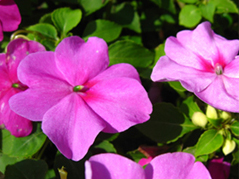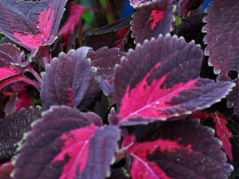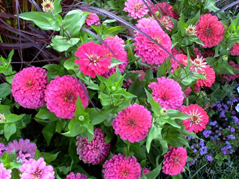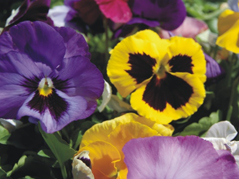 If you have a yard without a lot of sun it can be hard to find plants that will give you color all summer long. Many annuals are sun-loving plants that won’t produce flowers in the shade, or if they don’t receive enough light the plants may stretch out and become unattractive. There are a wide variety of annuals that prefer the shade and if they are planted together will give you continuous color all summer long. They can be planted anywhere that you don’t receive much light, such as along walls of houses or in flower beds that are shaded by trees.
If you have a yard without a lot of sun it can be hard to find plants that will give you color all summer long. Many annuals are sun-loving plants that won’t produce flowers in the shade, or if they don’t receive enough light the plants may stretch out and become unattractive. There are a wide variety of annuals that prefer the shade and if they are planted together will give you continuous color all summer long. They can be planted anywhere that you don’t receive much light, such as along walls of houses or in flower beds that are shaded by trees.
 Another problem that can come with planting in the shade is inadequate amounts of water. If there is a large tree canopy or the roof of your house hanging over he garden bed the rain may completely miss the plants underneath them. It is important to water these areas so that the plants will remain healthy. If the plants get an inch of water per week they usually will do well. Most annuals that like the shade also like a well-drained, fertile soil. To help your plants thrive, add organic material to your soil prior to planting them.
Another problem that can come with planting in the shade is inadequate amounts of water. If there is a large tree canopy or the roof of your house hanging over he garden bed the rain may completely miss the plants underneath them. It is important to water these areas so that the plants will remain healthy. If the plants get an inch of water per week they usually will do well. Most annuals that like the shade also like a well-drained, fertile soil. To help your plants thrive, add organic material to your soil prior to planting them.
Fertilizing every 3-4 weeks throughout the summer will also help the plants. When planting annuals in a shady spot it is a good idea to use plants that are already started rather than directly sowing their seeds in to the ground. Our growing season is from mid May-October. Plants can be either started from seed in the house and then transplanted when warm enough or they can be bought as small plants and put directly outside. Annuals that like shade: Impatiens, Wax Begonia, Coleus, Torenia, Mimulus.
 You may have a yard with a lot of sun. It is much easier to find plants that will give you color all summer long. There are a wide variety of annuals that prefer the sun and if they are areas which receive full sun so that the plants will remain healthy. If the plants get an inch of water per week they usually will do well. All annuals like a well-drained, fertile soil. To help your plants thrive, add organic material to your soil prior to planting them.
You may have a yard with a lot of sun. It is much easier to find plants that will give you color all summer long. There are a wide variety of annuals that prefer the sun and if they are areas which receive full sun so that the plants will remain healthy. If the plants get an inch of water per week they usually will do well. All annuals like a well-drained, fertile soil. To help your plants thrive, add organic material to your soil prior to planting them.
 Fertilizing a every 3-4 weeks throughout the summer will also help the plants. When planting annuals it is a good idea to use plants that are already started rather than directly sowing their seeds in to the ground. Our growing season is from mid May-October. Plants can be either started from seed in the house and then transplanted when warm enough or they can be bought as small plants and put directly outside.Some annuals that like sun Petunias, Marigolds, New Guniea Impatiens, Dahlias, Snap dragons, Geraniums, Pansies and many more.
Fertilizing a every 3-4 weeks throughout the summer will also help the plants. When planting annuals it is a good idea to use plants that are already started rather than directly sowing their seeds in to the ground. Our growing season is from mid May-October. Plants can be either started from seed in the house and then transplanted when warm enough or they can be bought as small plants and put directly outside.Some annuals that like sun Petunias, Marigolds, New Guniea Impatiens, Dahlias, Snap dragons, Geraniums, Pansies and many more.

